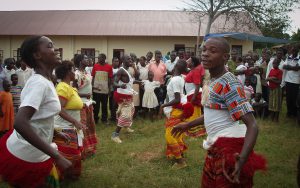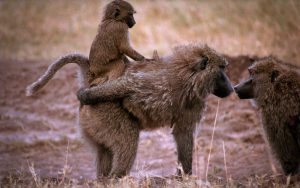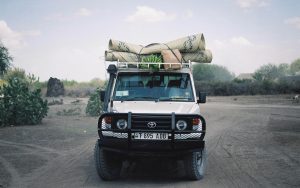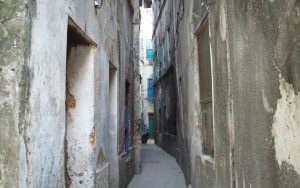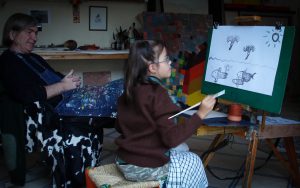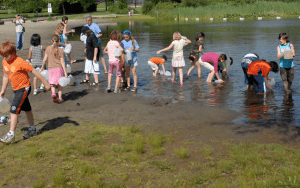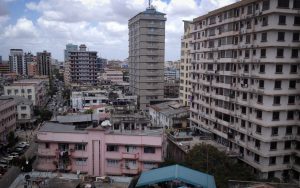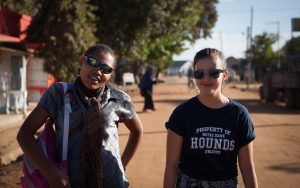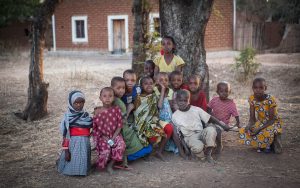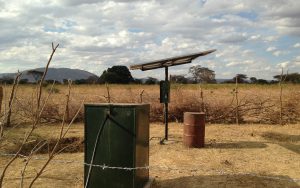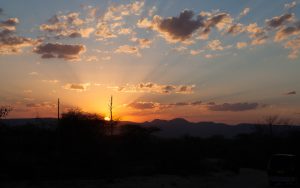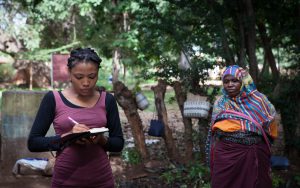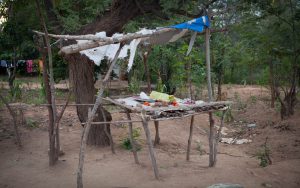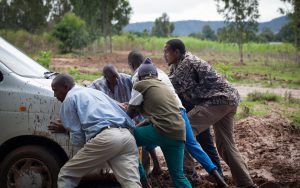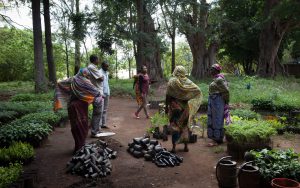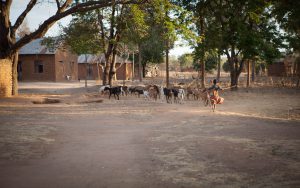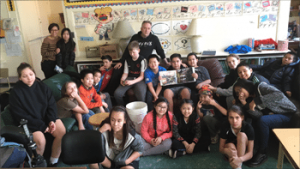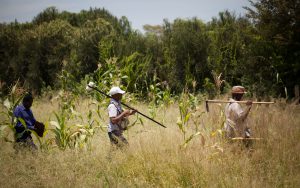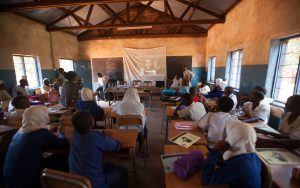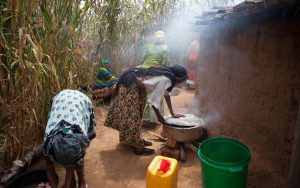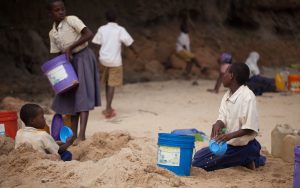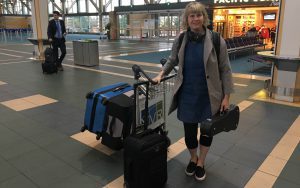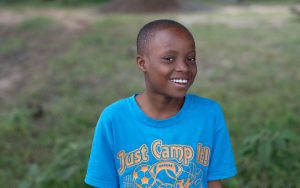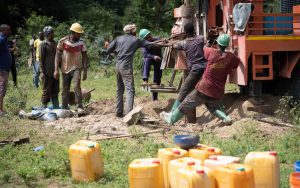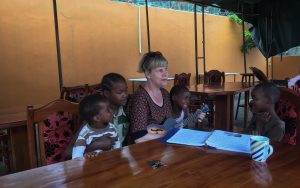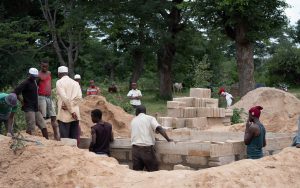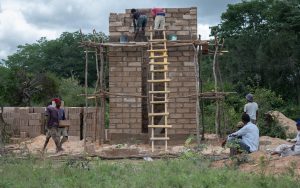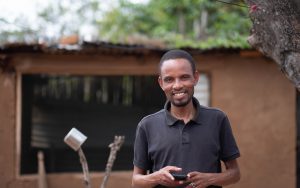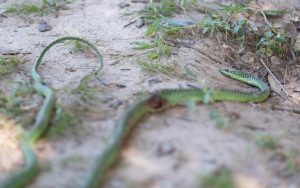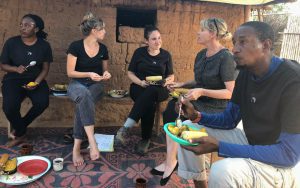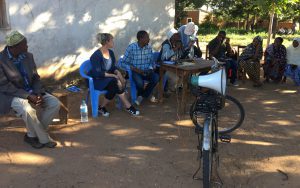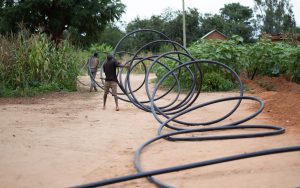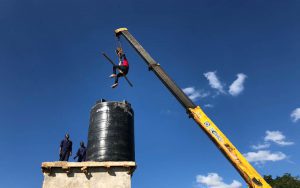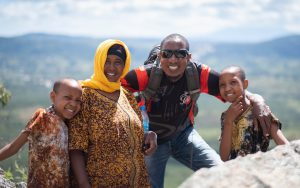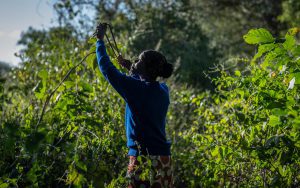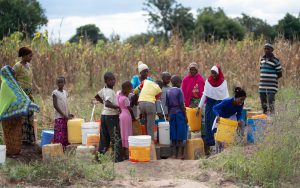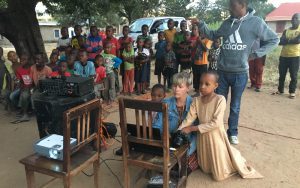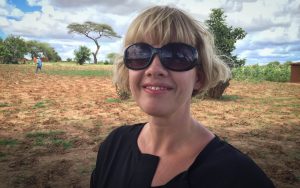As we finally drove up the long road dirt road to Cheku village, Moshi talked about the little things that happened during the project, like the rig getting stuck and the drillers having to turn back or the people from the village who came out to help make the bricks that were used to make the reservoir tank.
We got out of the car and the old man who had donated his land to the water project came to greet us. He wanted to designate the rest of the land that surrounded the well to the community so that they could plant and grow trees. I held his hand as we walked toward the site.
I could see the solar panels glimmering off in the distance.
When we arrived at the well, mommy was really happy, and I was too. After all this time, the well was real.

I have thought about this day many times over the last few years—and it was good. There are no words to describe that combination of relief, hard work, disbelief, and joy all at once. We stood at the site and smiled. There was water flowing out of two taps, and all it took was a bit of ingenuity—and of course about $40,000. However, since a village meeting was soon starting, we couldn’t spend too long marveling at the well.
When we arrived at the meeting, the women from the village threw the salt and water all over, like usual. We sat down and around a hundred people sat before us. The village meeting was held under a tree, and we sat on plastic chairs in front of a small table. The village chairmen talked first and then Moshi. Everything was said in Irangi and thankfully Yasinta translated. Moshi talked about the well and the importance of maintenance and our long trip here.
I had prepared a greeting in the mother tongue (Irangi), and after I recited the words of respect for the elders and greetings to the community, I sat down and listened for a long time as everyone spoke.
To say that Moshi could talk a lot is an understatement. For over an hour, he spoke to the community about the well and all of the environmental projects that could be implemented. Yasinta whispered a translation into my ear, which I then relayed to Zoe as we sat—overwhelmed but content—on the little red plastic chairs.
I had also prepared a greeting in Irangi, and so I stood up to thank the elders and the chief in their official way. Then, with Yasinta standing beside me translating, I went on to talk about everything that went into creating the well. I told them about how instrumental Perry was to the project, as well as the students in Vancouver who went walking for water to earn money.
Afterward, Moshi asked Zoe to stand up and say a few last words to the people of Cheku.
All of a sudden, Moshi told me to say something. They were pretty much all adults and it scared me. I had to think fast, so I spoke while Moshi translated, about the kids at Queen Victoria School and then everyone clapped. It made me happy. After that meeting, we were completely exhausted and were so happy to go back to our hotel room.
And finally, after so many years, the well was officially handed over—in person—to the people of Cheku.
We spent the next few days with Richard, who led the tree planting effort, and Abu, who was helping out. Moshi called another village meeting to talk about the work that was going to take place over the next few days and ask for volunteers. He and and Richard talked to them about the importance of trees and that in the future they would be a way to make money, feed their children, and provide medicine for the sick.
A singer from the village sang to energize us for the hard work that lay ahead. We all stood up and left the shade of the baobab tree. Then, to the beat of yellow buckets being used as drums by the women, we danced our way to the field where we would plant the trees. When we arrived, the singer continued to sing while the women walked back and forth to the well filling their buckets with water and pouring it into the holes being dug by the men.
As the sun beat down on the men, sweat fell to the ground in droplets as they tag-teamed the digging. One man would take a few big scoops and then hand the shovel off to another man. The dirt was as hard as a rock, and the digging sent puffs of dust drifting through the air.
The hole was big and lined with a mixture of straw and cow dung. The seeds were placed into the hole so that they sat in a basin and were able to retain every last drop of water. Zoe and I planted an avocado and a mango tree, respectively.
During this time, the school sent over the elementary students, and Zoe asked them to draw pictures for a school project.
I was in charge of the drawing project and told all the kids to get into groups and draw the things that represent their village and the environment they live in. There were around 100 kids from ages 6-12 looking at me and wondering what to do, which made me nervous and uncomfortable. They drew their homes and animals and even an airplane with the crayons and paper we brought. It took a long time but when we finished, we all went back to watch all the plants being planted. I planted an avocado tree, which really made me want an avocado.
Our time in Cheku ended, and we were both more than ready to go home.







